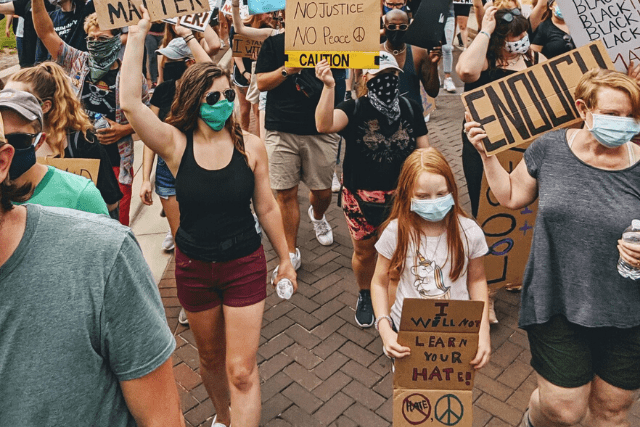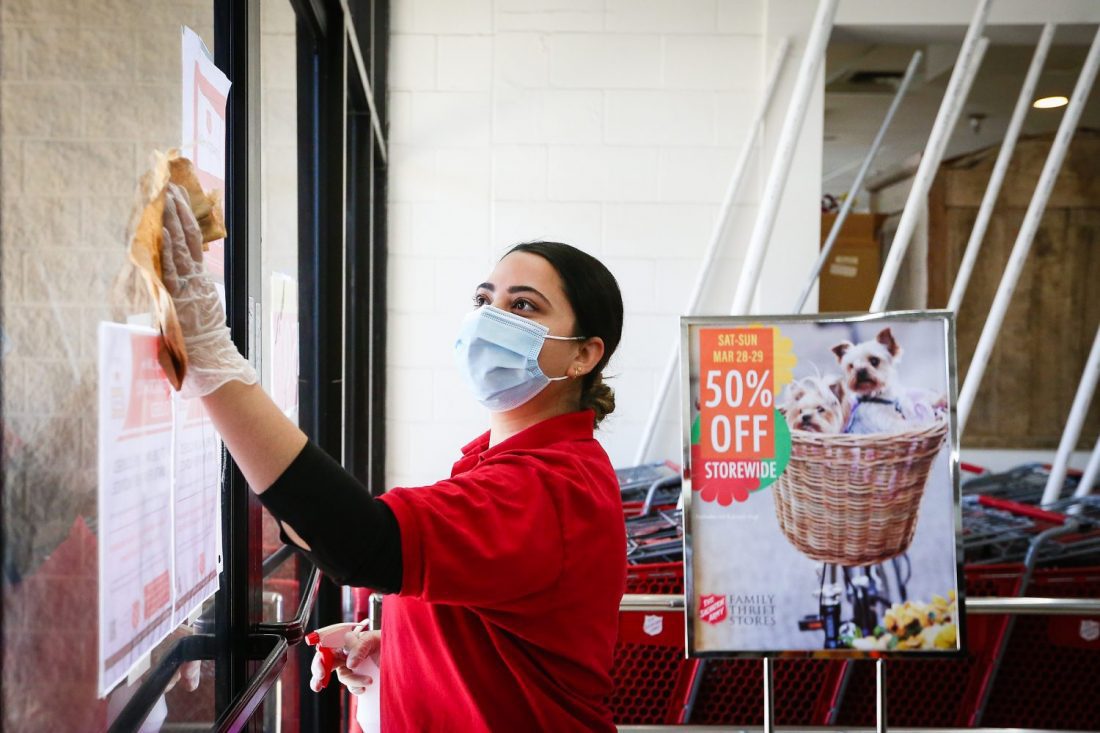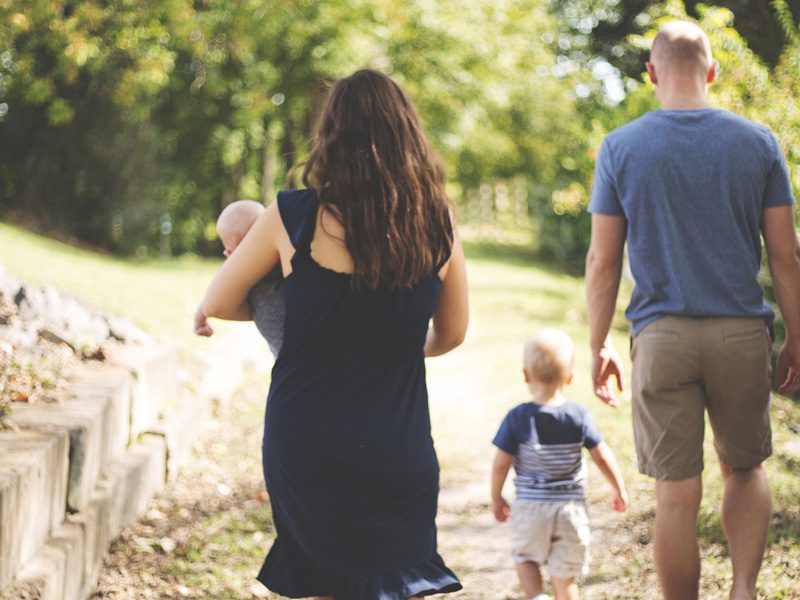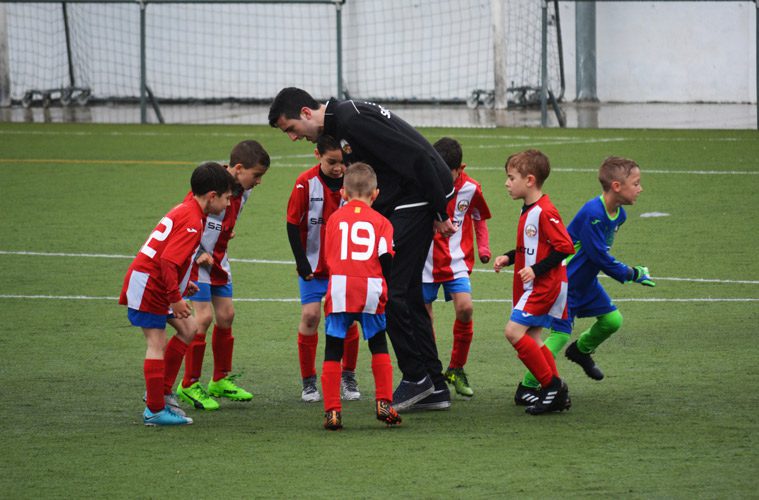By Kelly Rodriguez, LMFT–
Raising a new generation in the middle of a time where we are faced with chaos is not an easy task. In the last few weeks we have watched injustice put in the spotlight, but in reality, this has been a problem for hundreds of years. In order to change a systemic problem we need to disrupt what is not working to stop going in circles. This is an historic time in which we have a unique opportunity in our hands to choose to be agents of change and get to the root of the problem or simply be spectators.
As a parent it can be painful and scary to think about the world our children are growing up in. However, the real challenge is how to channel the emotions that injustice evokes into actually doing something about it. We may be experiencing a wide range of feelings—we may feel angry, confused, numb, afraid, overwhelmed, outraged. Some may even feel indifferent or prefer to remain silent and neutral. But how can we stay quiet when this is the society we live in?
What legacy are we leaving our children? What comes next for my family? What will happen in the upcoming weeks when the news changes its focus and forgets about the recent events? This is where the real challenge begins. We have seen people using different platforms to express their views, which is powerful. However, if we want to produce a wave of change for the years to come, we need to start in our family system. Family is one of the most transformative platforms to create real change in our society. We can either turn our backs and move on, or we become proactive in doing the hard work of confronting the real problem. Injustice and racism must be called by name. When we identify and name the problem for what it truly is instead of sugar coating it, we can be more effective in our efforts to do something about it.
The psychological impact of racism and injustice has a long-lasting effect that cannot be ignored. The individual and collective trauma caused by social injustice impacts people on different levels. The fear, the uncertainty, the hypervigilance, the powerlessness, manifest in different ways no matter the age. From a very young age, children start to recognize and learn ways to respond to those who look, talk and behave differently than them. If we want our children to practice kindness, justice, respect and love for others, we need to start now. What can we do to raise a generation that loves people, advocates for justice, and confronts a chaotic world?
Explore your implicit bias.
Before wanting to encourage our children to be peacemakers, we need to make sure we are truly ready and wanting to be part of the change. This will force us to first explore our own biases and values. This implicit bias refers directly to the ideas, attitudes and practices that influence our day-to-day behaviors; those ingrained values that we may not even be aware of. This may make us feel uncomfortable and may even bring up some shame and powerlessness for some. But when we address our own bias, we have the chance to grow. Could it be possible that we have been partaking in systemic injustice? Have I genuinely loved those who are different from me?
I urge you to truly look within and examine your beliefs. In what type of environments or communities do you feel more or less comfortable in, and most importantly, why? Do not be afraid to stay there for a moment, don’t rush it, reflect on it instead of shutting it down. The recent events have been a tipping point for many, and can become the awakening we need to lead us to challenge our own beliefs. Choosing to be part of the transformation is in fact uncomfortable and hard work. All of us have biases, but what we do about them is what makes the difference.
Explore your own family interactions.
After acknowledging and reflecting on our own biases, we can now start to explore our family dynamic. The hard work starts when we make difficult topics part of our conversations. When was the last time you talked about justice and diversity in your home? It could be that you have been doing some work but there is more that can be done. Maybe the first conversation we need to have with our families will be taking responsibility for any unkindness we have modeled in the past. In order to help our children live justly and kindly we need to feel convicted, pray about it and take action. We can talk about our family values and interactions and break unhealthy cycles.
Another way that this can be done is, for example, learning about microaggressions. This refers to the subtle ways we may have individually or as a family put others down in a “polite” way. Microaggressions may easily become part of our family system without realizing it and these are reflected in other settings. These are manifested in different ways (comments, jokes, the way we look at others). They send an implied message to people who are different from us that “they don’t belong.” In most cases the person receiving it is expected to tolerate it because it is not a “direct or clear offense.” We can teach our children to be mindful about the way they perceive and talk to people from other races, genders and backgrounds.
Take a stand and set clear boundaries.
Children, no matter the age, are looking up to us for guidance to help them define their values. When we clearly define our views and beliefs, we also set clear boundaries in what will be tolerated as a response to diversity within our family dynamic. Being permissive and unclear regarding our family values creates confusion and ambivalence. Children are very good at knowing when we are being honest and genuine. If we talk about respecting and loving others, our family dynamic is where it starts.
Talk to your children about specific behaviors that will not be considered acceptable. For instance, how to respond when someone is making an inappropriate joke. Instead of remaining quiet or laughing about it will we stand up against it? Remember that silence is a stand in itself. We must also pay attention to our children’s attitudes, comments and behaviors because they are also being influenced by other people in different settings. When we set a strong foundation and clear boundaries, our children will be more open to talk to us about unfair situations and how they can be part of the change when they witness injustice.
Open your mind and heart to new experiences.
What are the places and people you most often interact with? It is understandable that we feel inclined to spend our time with people who have similar interests. However, this is another opportunity to practice respect for diversity with our families. How can our children have opportunities to embrace and respect diversity if we never expose them to it?
For younger children we can use toys, books, playdates, shows, Bible stories and examples of their social interactions with people who are different from them. It is an opportunity to help them practice positive ways to respond to unfairness and inequality. For older children, have conversations about what they think about diversity, the accounts they follow and how they choose their friends. Identify ways for them to learn and interact with a variety of people. By doing so we are offering opportunities to practice inclusivity. Be open to listen to them and show interest when they express their curiosity.
Model empathy.
The new generations are watching us. They are looking up to us to model justice, empathy and kindness. We can have conversations, read books, pray, but if our actions do not match our values, we are missing out on making a real impact. The ways we respond to the suffering of others will help the new generations to be world changers. How are we modeling empathy? Our children will learn to practice empathy through us. Empathy moves us from remaining spectators to responding to others’ suffering with compassion.
Amplify the importance of using their voices.
Reminding our children of the importance of being a voice for the voiceless will lead them to take a proactive role against injustice. Teach them that their voices are valid, important and need to be heard. It is also important to mention that speaking up against injustice will not always be well received. However, this is part of the process and it does not mean it is not producing change. Encourage them to wisely speak up, stand up for themselves and for others and have a direct influence in the community.
If you are already doing some of these things, identify ways to increase their frequency and effectiveness. These small steps will produce change when we make them part of our ongoing family dynamic, not only when the news puts a spotlight on it. Remember that these conversations and actions do not need to be perfect or provide all the answers, they just need to start taking place. The change happens when we take a stand and decide what role we will choose to have moving forward regarding injustice.
About the Author
Kelly Rodriguez is a Licensed Marriage and Family Therapist in private practice in Southern California. She believes you are the expert of your life, yet, you are not alone in finding hope. Kelly knows firsthand the life change that can come from the right support and now works as a therapist to facilitate a process of growth for others.
Do Good:
- Do the hard work of turning inward and considering your own biases and how they might show up in your life as microaggressions. Then have a family meeting and discuss current events and how you can improve and be anti-racist in your family.
- See how you can get involved in the Fight for Good with The Salvation Army.
- Did you know The Salvation Army served more than 23 million Americans last year fighting hunger, homelessness, substance abuse and more—all in a fight for good? Where can you help? Take our quiz to find your cause and learn how you can join in today.

















